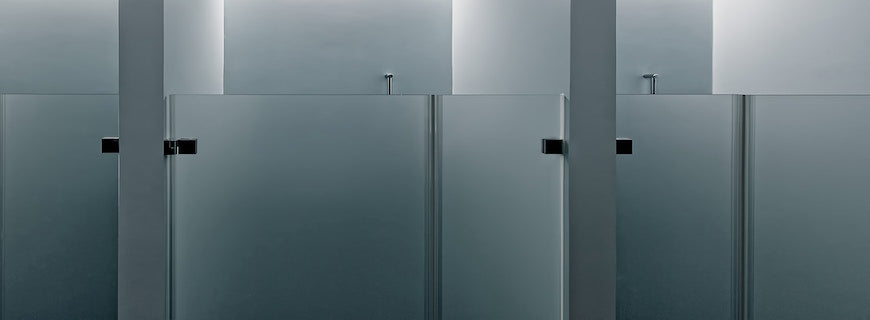Although tap water filters have become ubiquitous due to the growing awareness of contaminants in our supply – everything from microplastics and hormone residues to trace pharmaceuticals and volatile organic compounds – some people would never think twice about stepping under the shower.
After all, showering gets you clean, no?
Although shower head filters remain something of a niche purchase, there are many valid reasons why you might wish to install one – particularly if you value the appearance of your hair and skin.
Why Filter Your Shower Water?
Most people would consider a shower filter one of two things: a needless luxury or entirely pointless.
This is because most people don’t understand the effects certain types of water can have on hair, skin, nails and even our internal body systems.
Elements present in water – including high levels of minerals (‘hard water’) or even regulation levels of chlorine – can cause flare-ups, dryness and irritation.
They can also make it difficult for you to properly wash your body, leading to dull, flaky skin and clogged pores, and they can wick moisture and natural oils from your skin too.
Hair can similarly be sapped of its natural vitality by the presence of elements in your shower water, giving it a roughened feel and look.
The reasons are not purely aesthetic; many people are hesitant about the damage they might suffer internally due to chlorine in shower water. Take gut health as just one example.
Chlorine kills bacteria. Yes, that includes bad bacteria – waterborne pathogens which could make us very sick – but also good bacteria.
When we shower in an enclosed environment, we inhale chloroform – a byproduct of chlorine – which can wreak havoc on our intestinal flora, wiping out colonies of beneficial microbes.
Studies show that taking a ten-minute shower in warm water – which opens up pores – can result in a greater chloroform intake than if you drank eight glasses of chlorinated water.
Many people mistakenly view their skin as a barrier against contamination, but that couldn’t be further from the truth.
According to studies conducted by the University of Pittsburgh, transdermal absorption is responsible for 64% of waterborne contaminants entering the human body.
The main reasons for using a shower head filter are therefore threefold: Comfort – softening water to make it gentler on hair and skin; Aesthetic – purifying water to engender smoother, healthier skin and hair; and Health-Based – removing chlorine, heavy metals or other contaminants which, when ingested, may entail negative effects.
Chlorine in Shower Water: A Cause for Concern
Absorbing chlorine from shower water is something which should concern us all.
Inhaling chlorine gas not only assaults our intestinal microbial ecosystem – now believed by many to be the true seat of health – but it introduces toxic fumes into our bloodstream.
Exposing one’s lungs to chlorine is problematic because chlorine combines with organic matter in water to form dangerous Trihalomethane (THM) compounds which stimulate the production of free radicals and are classed as probable carcinogens.
Chloroform is just one example of a harmful THM, and it is cited most often because it is found in the highest concentrations; the others, for the record, are bromodichloromethane (BDCM), dibromochloromethane (DBCM) and tribromomethane (bromoform).
Chronic exposure to high-dose chloroform results in deleterious effects on the central nervous system, liver, kidneys and heart, and while no-one is suggesting that you are exposed to cripplingly high doses when you shower, it is understandable that people wish to minimise their contact with it.
Although most of the research into the effects of chloroform have been performed on rats (for obvious reasons), the few human studies published to date expose a link between chlorinated water intake and increases in cancer diagnoses, specifically rectal, colon and bladder cancers.
One oft-cited study found that women with breast cancer have 50-60% higher levels of organochlorines (chlorine by-products) in their breast tissue than women who are cancer-free.
According to a 2013 human health risk assessment, “Cancer risks from exposure to THMs can be controlled by reducing THMs in water supply and varying shower stall volume, shower duration and air exchange rate in (the) shower stall.”
Shower Head Filter Options
The following three shower filter options comprise the majority of the market. Most kits come with everything you need, although usually replacement cartridges need to be purchased every 3, 6 or 12 months.
• Dechlorinating Shower Heads
If you’re looking to minimise your exposure to toxins, a dechlorinating shower head is a no-brainer. These filters do what they say they do, absorbing chlorine and eliminating it (and its odour) from your shower in seconds.
A good example is the Biocera Premium Shower Head, whose filtration is achieved using a combination of natural bioceramics. These bioceramics comprise dechlorinating balls, tourmaline balls and antibacterial balls, and as well as getting rid of chlorine they also energise the water and destroy harmful bacteria.
Like other dechlorinating filters, this model can be fitted to any hand-held shower and it’s certified by the NSF. As a bonus, it even helps you save 25% of water.
• Softening Shower Heads
So you want to filter hard water? Good for you. Hard water isn’t a problem for everyone, but if you’re unfortunate enough to live in such an area, it can be terrible for your hair and skin.
There are many screw-on filters out there which can transform your hard water into soft water, removing the likes of copper, calcium and lead to give you a pleasanter shower experience.
Softening filters are generally inexpensive, so it’s definitely a worthwhile investment if hard water is causing break-outs, rashes, itchiness or just general discomfort.
If you’re unsure whether the water in your area is hard, it’s worth contacting the utility company to find out. It could be that chlorine, rather than hardness, is the source of any irritation to the skin or hair.
• Vitamin C Shower Heads
Feel like a vitamin C-infused shower? This beauty trend first attracted attention in 2013, with the promise of leaving hair and skin rejuvenated.
This is because vitamin C is an effective chlorine neutraliser.
However, it should be noted that vitamin C blocks are usually accompanied by a blend of mineral balls to get the job done.
Biocera’s Vitamin C Shower Filter is a good option: the easy-to-fit, cherry-scented filter combines antibacterial bioceramic balls and antioxidant vitamin C to provide a gentle aromatherapy effect.
Conclusion
We’re always shocked by the number of people who fail to consider the effect showering can have on their wellbeing.
With any luck, these options will help you make an informed decision. Showering should be a pleasant experience, not an avenue for ill health or a cause of damage to skin and hair.
Needless to say, you can get in touch with us if you want to find out more about our shower filters from Biocera. We are proud to stock their products, and the feedback we’ve received highlights the benefits customers have enjoyed.
In one review, a customer noted “Love the shower head filter as it removes much of the harmful elements in our water. The water pressure is still great and you want to stay in the shower longer as you know the water is more healthy!“




























Leave a comment